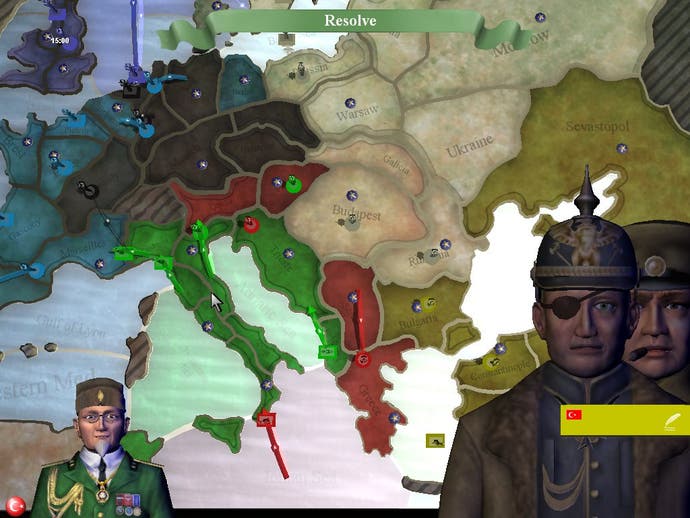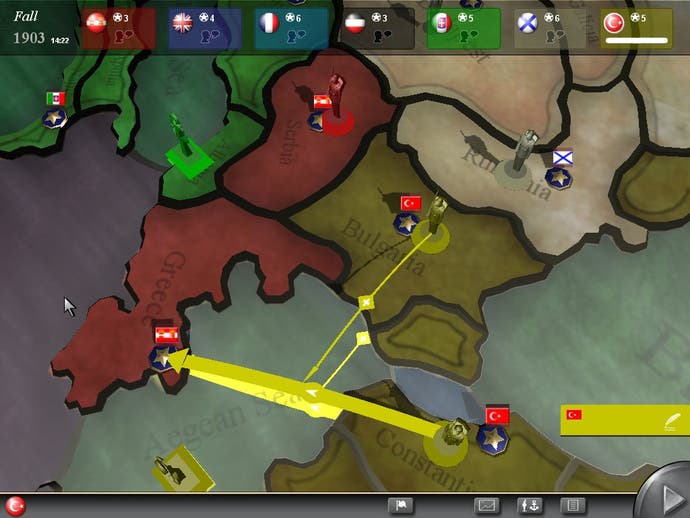Diplomacy
There's no diplomatic way of putting this. It's weak.
I've got a few ideas for PC games that I'd like to run past you. They are all conversions of classic board-game favourites with an added twist. The first concept is a streamlined software version of Monopoly in which all the properties on the board cost the same amount to buy, and generate exactly the same amount of rent. Sound tempting? Okay, how about a PC incarnation of Chess without those fiddly pawns? No? A slimmed-down virtual Cluedo with only two suspects and two weapons? Surely you'd buy that?
No, of course you wouldn't. Classic board-games are classics for a reason. Ripping out important elements is likely to end in tears. Paradox's Diplomacy proves this all too well.
Jaw-jaw not war-war
The board-game on which this title is based is (and this is a very crude description) a kind of multiplayer chess played on a stylised map of early Twentieth Century Europe. The genius is the emphasis placed on negotiation between players. To have any chance of surviving and winning you have to befriend and sometimes betray your playmates. Whispered deals are struck in quiet corners between turns - I'll support your invasion of Italy if you transport my armies over to England. Let's both hit France at the same time then split the spoils. Unit orders are then written down secretly and exposed and executed simultaneously.
The problem with Paradox's interpretation of this wonderful concept is that it provides no means whatsoever for conducting sophisticated negotiations. In a misguided attempt to overcome a largely non-existent language barrier, the devs have rejected the most obvious communication mechanism - private text or voice chat - implementing instead a horribly primitive 'move proposal' system. Rather than chinwagging freely with a fellow player, you are forced to go through a laborious procedure of plotting the desired move (using your friend's forces where necessary) and then sending this plan over to him or her for approval. The problem with this is that you can't explain why you want to do something and you never know quite why a scheme has been turned-down. It's basically, 'Please do this during the next move' or nothing.
By stripping most of the subtlety out of deal-making, Paradox seriously sours multiplay. A disappointment but not a disaster; there's always single-player isn't there? Yes there is, but the solo mode has its discouraging weaknesses too.
Make your own luck

Before we look at those, here's a bit more information about how Diplomacy works. As mentioned earlier, the play arena is a patchwork of European regions. Most of these are already under the ownership of one of the seven playable powers (Britain, France, Germany, Italy, Russia, Austria, and Turkey) at the start of the game; a few contain the crucial supply centres that determine victory and enlarge (by one unit per centre) your armed forces. There are only two types of military units in the game (armies and fleets) and both of these are of equal combat strength. Driving an enemy unit out of a territory is simply a question of overwhelming it. No electronic dice are ever rolled. An offensive involving two attackers will always cause a single unsupported defender to retreat.
There's a bit more complexity to the rules than this (fleets can be used to transport armies across sea zones for instance) but basically that's it. Considering this core simplicity and the limited number of territories on the board, you'd think creating a proficient AI would be relatively easy. It obviously isn't that easy because what Paradox has come-up with is passable but hardly Deep Blue. Most of the time CPU-controlled nations operate without much rhyme or reason, or character. Uniformly aggressive, they rarely defend their supply centres that well or work together sensibly. Often it's possible to win without talking to or co-operating with your neighbours at all. Diplomacy without diplomacy. That can't be right.
Constipated commanders-in-chief

When the game's omissions and weaknesses are viewed besides some of its more frivolous graphical features you are definitely left wondering whether the designers had their priorities right. In few strategy titles is a zoom-able, pan-able 3D map less necessary than it is here. The animated leaders that pop-up at different times don't look all that bad, but they sound as mad as hares. Their bizarre grunts and coughs are the kind of thing you'd expect to hear emanating from a toilet cubicle rather than a smoky oak-panelled conference room.
There are positives to the game, but they are not the kind of thing you could build an advertising campaign around. Documentation and accessibility are excellent by today's standards. If you've ever wrestled with other Paradox titles like Europa Universalis, Hearts of Iron, or Victoria then Diplomacy will seem very friendly in comparison. Those with previous Paradox experience will also know that the devs tend to stick around for years tweaking their projects with numerous patches. Come back in twelve month's time and this game might well have a private chat facility and an AI that can run rings round an average player. Then again, it might not.
Not our diplomatic bag
Ultimately, it's very hard to recommend Diplomacy. If you are looking for a multiplayer version of the classic board-game you're almost certainly better-off going to community sites like www.diplom.org and exploring some of the free Play-By-EMail options (bewilderingly Paradox have chosen not to include a PBEM or a hot-seat mode). Not only do these offer superior negotiating possibilities, they are also a lot more variant-friendly (Dip like Chess has been adapted into many different forms). Of course, by far the best way to experience Diplomacy remains the old face-to-face option.
Now, before you dash off, can I interest you in a copy of my new PC Scrabble Lite? It's the board-game that you know and love minus those irritating zeds, 'x's and 'q's. Buy two and I'll even throw in a free edition of Quick Pictionary (pictures come pre-drawn) or Turbo Ludo (the virtual dice have six dots on every face).







